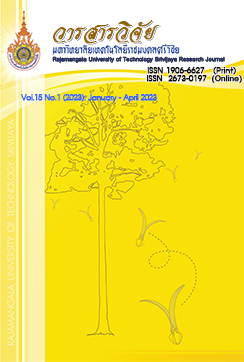Characterization of Sandwich Structured Composites between Rice Flour-based Thermoplastic Starch and Rice Straw
Keywords:
Thermoplastic starch, Rice straw, Rice flour, Sandwich structured compositeAbstract
The sandwich structured composites with rice flour-based thermoplastic starch (TPS) and rice straw (RS) were prepared. The effects of different TPS types (glutinous rice flour (GTPS), rice flour (RTPS), and mixed rice flour (MTPS)) and types of sandwiched composite (3 and 5 layers) on the density and tensile properties of these composites were investigated. The results showed that the density of all RS-TPS composites was lower than each neat TPSs. The differences of TPSs types and sandwiched composite types did not affect the density of these materials. On the contrary, the tensile modulus and tensile strength of all RS-TPS composites showed a strong improvement with an increase up to 193-461% and 111-194%, respectively, compared with each neat TPS. However, the efficiency of composite’s tensile property improvement strongly depended on the TPS types. Composite using GTPS having high melt flow index displayed high potential to improve the tensile properties. The SEM investigation revealed that the GTPS matrix easily flowed and wetted into the RS reinforcement layer during compression. This resulted in enhancing the composite’s tensile properties. In contrast, using RTPS with a low melt flow index in composites did not show evidence of RTPS penetrating into RS layer. So, RS-RTPS composite showed only the improvement in tensile modulus but not in tensile strength. The sandwich composite with three layers showed better improvement in tensile properties compared with five layers in all TPS composite types.
References
Battegazzore, D., Bocchini, S. and Frache, A. 2016. Thermomechanical improvement of glycerol plasticized maize starch with high loading of cellulose, flax and talc fillers. Polymer International 65: 955-962.
Bayer, I.S., Guzman-Puyol, S., Heredia-Guerrero, J.A., Ceseracciu, L., Pignatelli, F., Ruffilli, R., Cingolani, R. and Athanassiou, A. 2014. Direct transformation of edible vegetable waste into bioplastics. Macromolecules 47: 5135-5143
Honnak, C. 2020. Guidelines for development, production and marketing of Thai rice. Journal of Thai Ombudsman 13(1): 91-116. (in Thai)
Kaewtatip, K. and Thongmee, J. 2012. Studies on the structure and properties of thermoplastic starch/ luffa fiber composites. Materials and Design 40: 314-318.
Kaewtatip, K. and Thongmee, J. 2014. Preparation of thermoplastic starch/treated bagasse fiber composites. Starch/Staerke 66: 724-728.
Kengkhetkit, N. and Mopoung, R. 2019. Physical and Mechanical Properties of Thermoplastic Starches from Wet Milled Rice Flours. Agricultural Science Journal 50(Suppl. I): 442-448. (in Thai)
Ma, X., Yu, J. and Kennedy, J.F. 2005. Studies on the properties of natural fibers-reinforced thermoplastic starch composites. Carbohydrate Polymers 62: 19-24.
Mohanty, A.K., Misra, M. and Drzal, L.T. 2002. Sustainable bio-composites from renewable resources: opportunities and challenges in the green materials world. Journal of Polymers and the Environment 10: 19-26.
Pollution Control Department. 2004. Effects of open burning. Journal of Burning-Free Agriculture 2: 2-3. (in Thai)
Prachayawarakorn, J., Chaiwatyothin, S., Mueangta, S. and Hanchana, A. 2013. Effect of jute and kapok fibers on properties of thermoplastic cassava starch composites. Materials and Design 47: 309-315.
Prachayawarakorn, J., Ruttanabus, P. and Boonsom, P. 2011. Effect of Cotton Fiber Contents and Lengths on Properties of Thermoplastic Starch Composites Prepared from Rice and Waxy Rice Starches. Journal of Polymers and the Environment 19: 274-282.
Saiah, R., Sreekumar, P.A., Gopalakrishnan, P., Leblanc, N., Gattin, R. and Saiter, J.M. 2009. Fabrication and characterization of 100% green composite: Thermoplastic based on wheat flour reinforced by flax fibers. Polymer Composites 30: 1595-1600.
Varda, M., Darshan, M. and Nishith, D. 2014. Can a starch based plastic be an option of environmental friendly plastic?. Journal of Global Biosciences 3(3): 681-685.
Wattanakornsiri, A., Pachana, K., Kaewpirom, S., Sawangwong, P. and Migliaresi, C. 2011. Green composites of thermoplastic corn starchand recycled paper cellulose fibers. Songklanakarin Journal of Science and Technology 33(4): 461-467.
Zhang, Y., Thompson, M. and Liu, Q. 2011. The effect of pea fiber and potato pulp on thermal property, surface tension, and hydrophilicity of starch-based bioplastics. Carbohydrate Polymers 86: 700-707.
Downloads
Published
How to Cite
Issue
Section
License
Copyright (c) 2023 Rajamangala University of Technology Srivijaya Research Journal

This work is licensed under a Creative Commons Attribution-NonCommercial-NoDerivatives 4.0 International License.
The content and information in the article published in Journal of Rajamangala University of Technology Srivijaya It is the opinion and responsibility of the author of the article. The editorial journals do not need to agree. Or share any responsibility.







